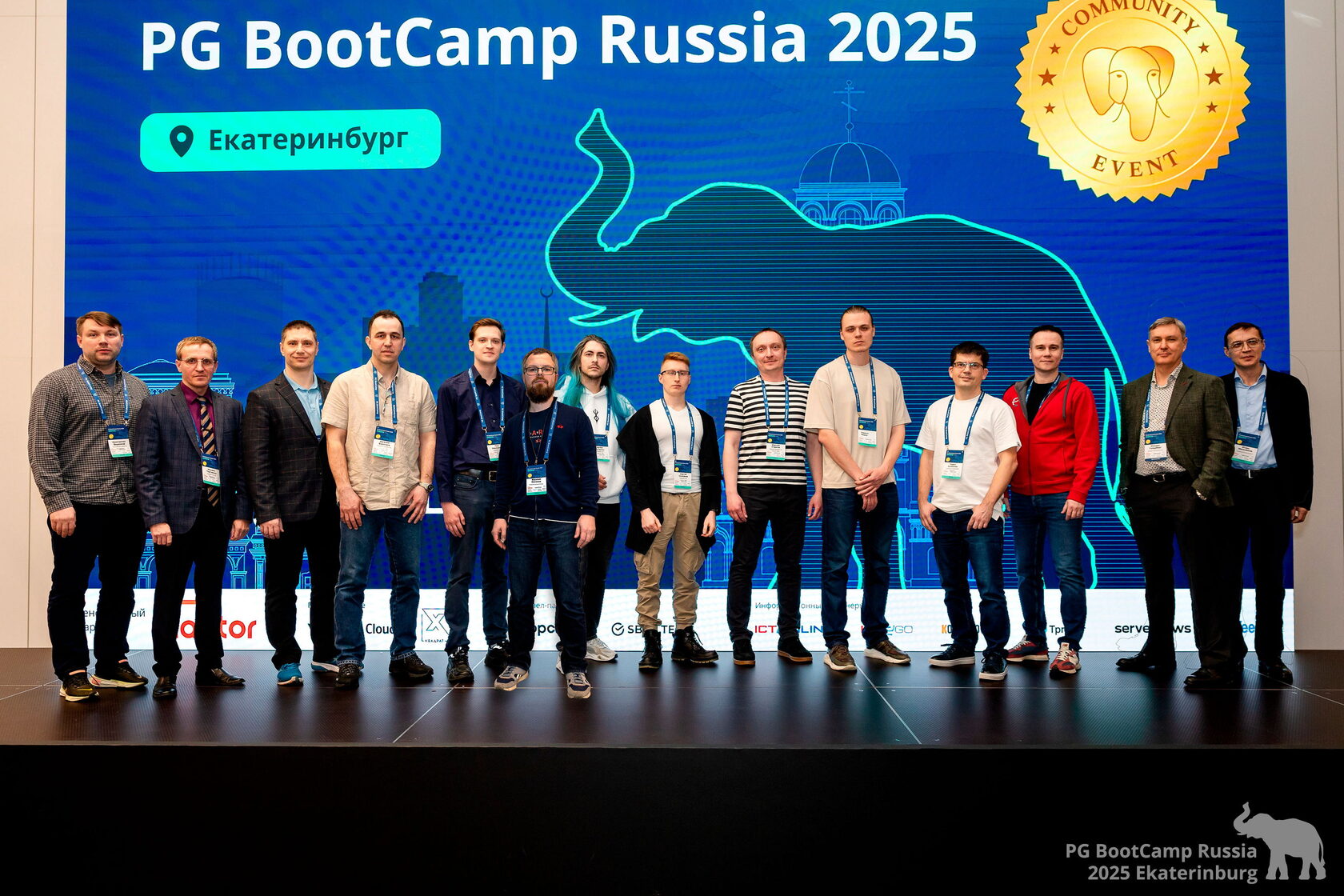The PG BootCamp Russia conference featured 16 presentations covering various aspects of working with PostgreSQL: query optimization, replication, data compression, data recovery, testing, as well as time series processing and real-time modification of data structures. The conference drew over 1500 participants, including 230 who attended in person. The general partner of the event was the Russian company Tantor Labs, a PostgreSQL-based DBMS developer.

This year, on April 10, Yekaterinburg became the venue for the fourth PG BootCamp Russia conference — the official community event dedicated to the development and use of PostgreSQL DBMS. The event was supported by its general partner TANTOR LABS company — developer of the Tantor Postgres DBMS family.
Traditionally, PG BootCamp is attended not only by professional developers and database administrators, but also by analysts, architects, managers and executives, students and freelancers. The program is structured to provide everyone with the chance to both enhance their understanding of the PostgreSQL kernel and ecosystem, as well as gain hands-on experience working with this open-source database management system.
Previous conferences were held in 2023 and 2024 in Moscow, Minsk and Kazan, and the very first PG BootCamp was held in 2023 in Tel Aviv. Bruce Momjian, a member of the PostgreSQL Core Team and one of the founding fathers of PostgreSQL, and Michael Goldberg, the then chairman of the PostgreSQL Code of Conduct Committee, initiated creating a platform for hands-on training and interaction between developers and users.
More than 2800 people have registered for PG BootCamp Russia 2025 in Yekaterinburg, over three hundred of them attended the conference in person, and the rest participated online.

“PostgreSQL is not just a database management system, but a global community where open source, quality, and continuous development have become the core philosophy that has made Postgres one of the most reliable and popular DBMSs in the world. For us, as organizers of this official community event, it's crucial that the conference remains engaging for anyone learning or utilizing this remarkable DBMS," says Vadim Yatsenko, CEO of TANTOR LABS.
This time the event was divided in two tracks: one track was devoted to PostgreSQL “internals”, while the other one mainly focused on operational issues.
Maxim Milyutin and Sergey Soloviev (TANTOR LABS) conducted an in-depth technical analysis on optimizing PostgreSQL queries by focusing on preprocessing the initial query tree. They also highlighted methods for enhancing query performance and making the query plans easier to handle.


Igor Melnikov of FORESIGHT focused on the tracks of information lifecycle management (ILM). In his first presentation the speaker talked about automating data migrations across storage tiers, emphasizing cost-efficient infrastructure solutions for businesses. And during the second presentation Igor Melnikov showcased the dbms_redefinition extension, which enables dynamic restructuring of PostgreSQL tables "on-the-fly".

In his two talks, Alexander Nikitin (DBA.team) presented hands-on techniques for analyzing and optimizing SQL queries from a DBA perspective. He also explored logical replication in PostgreSQL, covering conflict resolution strategies and converting physical replicas into logical ones.

Attendees showed great interest in the presentation of Mikhail Torgovkin (Digital Development Center MAXIMUM) “Data Archaeology in PostgreSQL”. It focused on crucial methods for recovering lost data from corrupted or unreadable tables, including manual page parsing and leveraging low-level tools for restoration efforts.

The audience was particularly interested in presentation of Evgeny Voropayev (TANTOR LABS) on developing and testing a patch for the 64-bit PostgreSQL transaction counter—an essential feature for highly loaded systems.

Andrey Borodin and Kirill Reschke (Yandex.Cloud) in their separate talks revealed the internal mechanisms of WAL-G to reduce lag between Primary and Standby and the impact of binary compatibility of major versions of PostgreSQL and Greenplum on development.


Lev Nikolayev from TANTOR LABS introduced **pg_orchestrator**, a tool that simplifies automated testing of PostgreSQL updates using YAML manifests. Meanwhile, his colleague Artem Bugayenko talked about the factors PostgreSQL statistics is based on and highlighted key differences between Postgres approach and approaches implemented in other database management systems.


Pavel Seleznev from Pangolin explored various techniques for compressing data in PostgreSQL, including algorithmic analyses and their implications on system performance, and Maxim Starkov of TANTOR LABS focused on the intricate details of how PostgreSQL’s query planner estimates selectivity.


Vadim Yatsenko's presentation about upgrading the PipelineDB extension designed for high-speed aggregation of time series, “abandoned” by its original developers, elicited a lively response from the audience. The subject drew significant interest from developers working on streaming data pipelines and optimizing legacy solutions.

Konstantin Vashchenkov from XSQUARE demonstrated how to turn PostgreSQL into a functional RESTful API server with efficient cross-system communication.

Closing out the event, Vasily Nikonov from INTELLECTUAL SYSTEMS spoke about leveraging static analysis tools to identify and mitigate latent errors in PostgreSQL databases. He also provided practical strategies for automating the discovery of structural vulnerabilities within these systems.

PG BootCamp Russia in Yekaterinburg once again confirmed the great interest of Russian and foreign specialists in current issues of development and use of the popular DBMS. The conference became a landmark event for the entire industry offering professionals a unique platform to exchange insights and showcase the outcomes of their efforts.